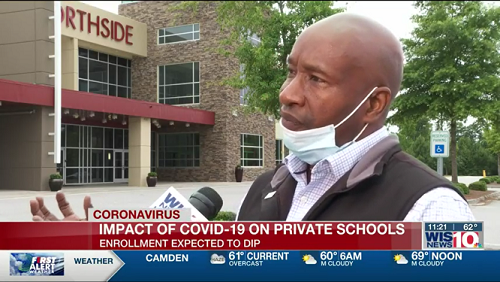Common Questions about Education Scholarship Accounts
Key leaders in the South Carolina General Assembly have filed legislation that, if passed, would create “Education Scholarship Accounts” (ESAs) for South Carolina students. ESAs are online-based accounts funded with state grants that can be used to pay a wide variety of educational expenses for a student who is eligible for the grants. Here are some of the most commonly asked questions about ESAs.
What is an ESA?
ESAs allow parents to apply for eligible students to receive funds (often the state portion of education funds the child would have received in public school) into a personal, parent-controlled account. Parents are then empowered to customize an education experience that meets the individual needs of their child, using their account to pay for approved services like tuition, therapy, tutoring, textbooks, and more.
Already successfully working in other states, ESAs are a powerful, proven innovation that creates one more critical pathway for South Carolina students to have a customized education that equips them to reach their full education potential.
Who would be eligible for a South Carolina ESA?
South Carolina’s current legislation blends the approaches of other successful state ESA laws. In its current form, the Palmetto State bill would extend ESAs to students who are starting K5 through 12th grade and have an annual family income of 200% or less of federal poverty guidelines.
Will the enactment of ESAs have an impact on South Carolina’s current Exceptional SC tax credit scholarship or Exceptional Needs parental tax credit?
No. ESAs do not in any way change this program, or the associated parental tax credit program. Exceptional SC Tax Credit Scholarships are funded through donations of state tax liability to an independently run non-profit organization that then issues scholarships to eligible students. ESAs simply offer one more option for some of these families—and many others—to help meet the unique educational needs of their student.
Will ESAs impact homeschooling in South Carolina?
The entry of ESAs onto the South Carolina educational landscape will not affect the rights of parents and students using the existing three options for homeschooling in any way. Homeschoolers using all three accountability methods will have the same freedoms and be unaffected by the ESA program.
Will ESAs create government interference or mandates for independent schools?
No. First, there is no obligation for any school to participate in the program. Second, unlike in a voucher program, the only financial transaction involving the state is when the state transfers funds to the parent’s account. The state does not directly pay any education vendors, including a private or religious school. Whether the parent spends ESA funds (legally, their student’s money not the government’s) on private schooling or some other form of education is up to them, as long as it is an ESA-approved expenditure. This keeps government out of independent schools and personal education decisions.
Will ESAs create financial hardships for traditional public schools?
No. Public schools in states that have ESA programs have not been harmed. For each student participating in Education Scholarship Account (ESA) programs, typically only the state portion of education funds will travel with the student. Federal and local funds are left behind, even though the school will no longer bear the cost of instructing the student. For example, local funds would still be available to cover fixed or overhead costs like buildings, and because the ESA student is no longer a cost to the school, those local funds would be spread over fewer students.
Will ESAs cause a “mass exodus” from traditional public schools?
No. If parents are pleased with the outcomes of their local public school, they will have no need for an ESA. Many parents are content with the school for which their student is zoned.
The best predictor of the rate of transfers to ESAs from public schools would be to look at the largest and longest-running programs: Arizona and Florida. In Arizona, nearly 10,000 students participate in the program (out of 1.1 million total students). In Florida, about 19,000 students benefit from Education Scholarship Accounts (out of a 2.8 million student population).
Will ESAs leave traditional public schools with all the “difficult” students?
No. ESAs are specifically designed to benefit students who face medical, personal, or economic challenges. Often, these are the students that fall behind or are not well-served in traditional education environments.
How do you ensure that funds are spent on actual education expenses?
South Carolina’s legislation applies lessons learned in other states with specific checks built-in to prevent intentional or unintentional misuse, such as the use of an online portal for purchases. Unlike with cash or a debit card, parents will not be able to buy anything they want with ESA funds, only approved items and services. This makes ESAs as—if not more—transparent than any other form of education spending.
Are ESAs too complicated for parents to use?
No. While there is a natural learning curve for everyone using something new, parents of all income levels routinely navigate financial decisions like housing costs, car loans, healthcare expenses and more. Consumer data shows that millennial parents, across all demographics, are well-versed in the use of online banking and similar products. Parents of all income levels in other states have proven its possible, and ESAs will empower South Carolina parents with the same options as their counterparts around the country.
Are ESAs the same as vouchers?
No. The key aspect that distinguishes ESAs from vouchers is parent control and customization. Instead of the state sending funds directly from the state to a specific private school, the state instead deposits funds into a parent-controlled account. These funds can then be spent on wide array of approved education services, not only private school tuition like in voucher programs.
Are ESAs constitutional?
Yes. Even as the U.S. Supreme Court has overwhelmingly upheld school choice programs of all stripes, state Constitutional questions born of bigoted anti-Catholic Blaine Amendments have routinely plagued voucher programs. However, Education Savings Accounts have withstood Blaine Amendment challenges precisely because of their legal differences from vouchers. Arizona, home of the nation’s oldest ESA program, provides the framework. According to the Institute for Justice, which successfully defended Arizona’s ESA program in state court and also won the recent Espinoza school choice victory before the U.S. Supreme Court:
“…the Arizona Supreme Court was faced with deciding whether two new state educational programs— traditional voucher programs—designed to educate special needs and foster children were constitutional under the Arizona Constitution. In Cain v. Horne, the Arizona Supreme Court said they were not and struck down these programs because parents had “no choice; they [had to] endorse the check” over to a private school.
[The Arizona Empowerment Scholarship Account program was] designed to comply with the specific instructions laid out by the Arizona Supreme Court in Cain v. Horne. There, the Court said it was “immaterial” that the “check or warrants first pass through the hands of parents” because once the child was accepted by a private school, both voucher programs at issue gave parents or guardians “no choice; they [had to] endorse the check or warrant to the qualified school.” That is not true of the Empowerment Account program. Parents have ample choice as to where and how to spend the money. The Empowerment Account program clearly transfers state funds to parents and children for educational purposes—not to private or religious schools.
The Arizona Supreme Court’s decision in Cain v. Horne was devastating for many parents whose children were flourishing in their school of choice. But, as is the American way, school choice supporters have turned adversity into an opportunity to expand educational freedom in a way that will save taxpayers money and in a manner that is entirely constitutional.
In 2020, Adams v. McMaster overturned South Carolina’s COVID-recovery SAFE Grants tuition grant program. The South Carolina Supreme Court, following a nearly identical logic to that of the Arizona Supreme Court, actually quoted the Cain v. Horne decision that found vouchers unconstitutional. But, the high court did not acknowledge subsequent Arizona rulings finding ESAs constitutional.
The ESA bill currently before the South Carolina legislature was drafted after that Adams decision, is state-funded (avoiding the narrow set of facts at play in the federally-funded SAFE Grants program), and follows Arizona’s clear and successful roadmap to create a Constitutionally-sound program.





